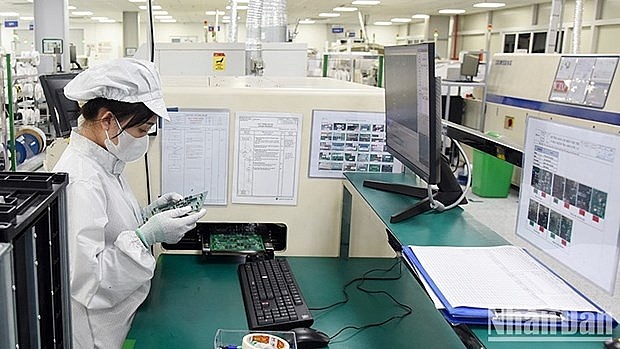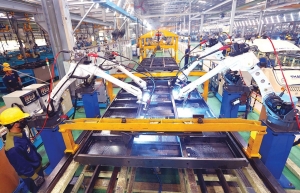Policies needed to boost production linkage, localisation rate: insiders
 |
| Illustrative photo (Source: VNA) |
Hanoi– Policies are needed to boost the number of domestic enterprises participating in the supply chain of multinational companies, and a boost is necessary in the localisation rate of the processing and manufacturing industry, which now remain modest, insiders said.
According to data from the Ministry of Industry and Trade (MoIT), local industry led in attracting foreign investment last year, with a combined registered capital exceeding 14.96 billion USD and accounting for 59.5% of Vietnam’s total FDI. So far, 107 countries and territories have invested in the industrial sector.
Deputy head of the MoIT’s Vietnam Trade Promotion Agency Le Hoang Tai called processing and manufacturing a magnet to foreign investors, including multinational conglomerates like Samsung, Toyota, Honda, and LG. The sector’s key units, such as telecommunications, electronics-IT, steel and cement production, and garment-textiles, are the most attractive, he noted.
However, just over 300 Vietnamese enterprises have been able to participate in the supply chains of these multinational corporations.
Vice Chairwoman and Secretary General of the Vietnam Association of Supporting Industries (VASI) Truong Thi Chi Binh said connecting with multinational companies is the shortest way for Vietnamese enterprises to participate in the global supply chain, but not many of them succeed.
According to a VASI study, support activities have only successfully linked about 3.2 enterprises in Ho Chi Minh City and 2.7 in Hanoi to foreign businesses on an annual basis.
The reason behind the assessment is the small scale of Vietnamese firms, as well as low competitiveness, and shortage of financial resources. These shortcomings conspire to cause Vietnamese firms to be unable to meet requirements of giant partners. Vietnam currently houses approximately 500 companies capable of supplying foreign groups.
Binh said the key for Vietnamese supporting enterprises to develop and participate more deeply in the chain of super-manufacturers is to cut production costs.
They need better access to credit, land, production premises, and factory building procedures, she said, adding that it is also necessary to increase their size and form clusters of enterprises and ecosystems serving the production of complete assemblies.
The official also recommended promoting localisation by preferential policies on tax, labour, and research and development (R&D).
 | Data localisation regulations in need of further guidance The long-awaited issuance of Decree No.53/2022/ND-CP last year guided the implementation of the Law on Cybersecurity. Given the decree features implementing rules on the law’s data localisation and local office requirements, businesses with operations involving Vietnam were in a scurry to understand how it would impact them going forward. Decree 53 provides specific rules that will enable regulators to enforce the aforementioned requirements, which until now had not been applied due to lack of guidance. That said, while Decree 53 took effect in October, there remain points that are unclear and in need of further guidance. |
 | Low localisation rate hindering progress A stronger supporting industry and focus on boosting localisation rates is deemed a prerequisite to help brands increase production and also reduce costs. |
What the stars mean:
★ Poor ★ ★ Promising ★★★ Good ★★★★ Very good ★★★★★ Exceptional
Related Contents
Latest News
More News
- IP alterations shape asset strategies for local investors (January 22, 2026 | 10:00)
- 14th National Party Congress: Vietnam - positive factor for peace, sustainable development (January 22, 2026 | 09:46)
- Japanese legislator confident in CPV's role in advancing Vietnam’s growth (January 22, 2026 | 09:30)
- 14th National Party Congress: France-based scholar singles out institutional reform as key breakthrough (January 21, 2026 | 09:59)
- 14th National Party Congress: Promoting OV's role in driving sustainable development (January 20, 2026 | 09:31)
- 14th National Party Congress affirms Party’s leadership role, Vietnam’s right to self-determined development (January 20, 2026 | 09:27)
- Direction ahead for low-carbon development finance in Vietnam (January 14, 2026 | 09:58)
- Vietnam opens arms wide to talent with high-tech nous (December 23, 2025 | 09:00)
- Why global standards matter in digital world (December 18, 2025 | 15:42)
- Opportunities reshaped by disciplined capital aspects (December 08, 2025 | 10:05)

 Tag:
Tag:




















 Mobile Version
Mobile Version